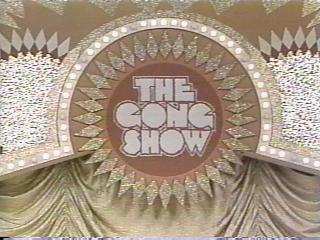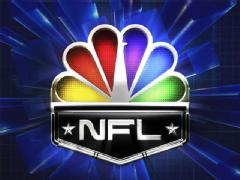Related Research Articles

The Gong Show is an American amateur talent contest franchised by Sony Pictures Television to many countries. It was broadcast on NBC's daytime schedule from June 14, 1976, through July 21, 1978, and in first-run syndication from 1976 to 1980 and 1988 to 1989, and was revived in 2017 for broadcast on ABC. The show was created and originally produced by Chuck Barris, who also served as host for the NBC run and from 1977 to 1980 in syndication. Its most recent version was executive-produced by Will Arnett and hosted by Tommy Maitland, a fictional character performed by Mike Myers. The Gong Show is known for its absurdist humor and style, with the actual competition secondary to the often outlandish acts presented; a small cash prize has typically been awarded to each show's winner.

Curtis Edward Gowdy was an American sportscaster. He called Boston Red Sox games on radio and TV for 15 years, and then covered many nationally televised sporting events, primarily for NBC Sports and ABC Sports in the 1960s and 1970s. He coined the nickname "The Granddaddy of Them All" for the Rose Bowl Game, taking the moniker from the Cheyenne Frontier Days in his native Wyoming.

I've Got a Secret is an American panel game show produced by Mark Goodson and Bill Todman for CBS television. Created by comedy writers Allan Sherman and Howard Merrill, it was a derivative of Goodson–Todman's own panel show, What's My Line?. Instead of celebrity panelists trying to determine a contestant's occupation, however, as in What's My Line, the panel tried to determine a contestant's secret: something that is unusual, amazing, embarrassing, or humorous about that person.

David Aldridge is an American sports journalist who works as a writer for The Athletic. He was previously a reporter for Turner Sports, contributing to their NBA and MLB coverage. Other outlets that Aldridge has written and contributed for include ESPN, NBA TV, NBA.com, The Washington Post, The Philadelphia Inquirer, and TBD. In 2016, he was awarded the Curt Gowdy Media Award by the Basketball Hall of Fame.

Cane River Lake is a 35 mi (56 km) oxbow lake formed from a portion of the Red River in Natchitoches Parish, Louisiana, United States. It runs throughout the Natchitoches' historic district to the south and is famous for the numerous plantations, particularly Melrose being located on or near its banks.

The NFL on NBC is the branding used for broadcasts of National Football League (NFL) games that are produced by NBC Sports, and televised on the NBC television network and the Peacock streaming service in the United States.

ABC's Wide World of Sports is an American sports anthology television program that aired on ABC from April 29, 1961, to January 3, 1998, primarily on Saturday afternoons. Hosted by Jim McKay, with a succession of co-hosts beginning in 1987, the title continued to be used for general sports programs on the network until 2006. In 2007, Wide World of Sports was named by Time on its list of the 100 best television programs of all time.

Monitor was an American weekend radio program broadcast live and nationwide on the NBC Radio Network from June 12, 1955, until January 26, 1975. It began originally on Saturday morning at 8am and continued through the weekend until 12 midnight on Sunday. After the first few months, the full weekend broadcast was shortened when the midnight-to-dawn hours were dropped since few NBC stations carried it.

James Shores Simpson was an American sportscaster, known for his smooth delivery as a play-by-play man and his versatility in covering many different sports. In 1997, he won the Sports Lifetime Achievement Award, and in 2000 he was inducted into the National Sportscasters and Sportswriters Association Hall of Fame.

Wide Wide World is a 1955–1958 90-minute documentary series telecast live on NBC on Sunday afternoons at 4pm Eastern. Conceived by network head Pat Weaver and hosted by Dave Garroway, Wide Wide World was introduced on the Producers' Showcase series on June 27, 1955. The premiere episode, featuring entertainment from the US, Canada and Mexico, was the first international North American telecast in the history of the medium.
Claude Hamilton Gresham Jr., better known as Grits Gresham, was an internationally known American sportsman, author, photographer and television personality who hosted ABC's The American Sportsman series from 1966 to 1979. Gresham, who resided on the historic Cane River Lake in Natchitoches, the oldest city in Louisiana, traveled throughout the globe, particularly South America and Africa, to engage in hunting, fishing and shooting with various American celebrities. He was a champion of the environment and conservation, the subject of his graduate school thesis.

William Shatner is a Canadian actor. In a career spanning seven decades, he is best known for his portrayal of James T. Kirk in the Star Trek franchise, from his 1966 debut as the captain of the starship Enterprise in the second pilot of the first Star Trek television series to his final appearance as Captain Kirk in the seventh Star Trek feature film, Star Trek Generations (1994).

Ralph W. "Bud" Leavitt Jr. was a Maine newspaperman who was executive sports editor of the Bangor Daily News, and a longtime outdoor columnist recognized statewide. In addition to his writing, Leavitt hosted one of Maine's earliest television shows, which was devoted to fishing, hunting and the out-of-doors. Leavitt's stature within the state was such that columnist Roy Blount Jr. wrote of the Maine sportswriter that he "fishes with Ted Williams and Red Smith – or, rather, they trout-fish with him." An early conservationist and son of a paper mill union leader, Leavitt urged the state of Maine to acquire lands for public use; one such preserve is today named for the sportswriter and television personality.
Steven Rinella is an American outdoorsman, conservationist, writer, and television personality known for translating the hunting and fishing lifestyle to a wide variety of audiences.

Charlie Moore, sometimes known as Charlie Moore the Mad Fisherman, is an American television sports personality. He is host of Charlie Moore: No Offense airing in national and worldwide syndication and available throughout the world on Google Play, Apple TV, Roku and the Charlie Moore: No Offense app, on Apple and Android devices. and Charlie Moore Outdoors on the New England Sports Network (NESN).
Joseph White Brooks was an American fly fisherman and popular writer about the sport of fly fishing during the mid-20th century. He was born in Baltimore, Maryland in 1901 and died in Rochester, Minnesota in 1972. He wrote for the leading fishing and outdoor magazines of the day and was the outdoor editor for The Baltimore Sun. He also wrote ten books about fly fishing, several of which are still considered leading authorities on the subject. He is listed by a leading online fly fishing publication, Fly Fishing Frenzy, as one of the 10 most influential fishermen ever. And the IGFA and others said he did more to popularize and expand fly fishing than any other individual.
In 1960, ABC returned to baseball broadcasting with a series of late-afternoon Saturday games. Jack Buck and Carl Erskine were the lead announcing crew for this series, which lasted one season. ABC typically did three games a week. Two of the games were always from the Eastern or Central Time Zone. The late games were usually San Francisco Giants or Los Angeles Dodgers' home games. However, the Milwaukee Braves used to start many of their Saturday home games late in the afternoon. So if the Giants and Dodgers were both the road at the same time, ABC still would be able to show a late game.
By 1969, Major League Baseball had grown to 24 teams and the net local TV revenues had leaped to $20.7 million. This is in sharp contrast to 1950 when local television brought the then 16 Major League clubs a total net income of $2.3 million. Changes baseball underwent during this time, such as expansion franchises and increasing the schedule from 154 games to 162, led to a wider audience for network and local television.
During the early 1960s, NFL Commissioner Pete Rozelle envisioned the possibility of playing at least one game weekly during prime time that could be viewed by a greater television audience. An early bid by the league in 1964 to play on Friday nights was soundly defeated, with critics charging that such telecasts would damage the attendance at high school football games. Undaunted, Rozelle decided to experiment with the concept of playing on Monday night, scheduling the Green Bay Packers and Detroit Lions for a game on September 28, 1964. While the game was not televised, it drew a sellout crowd of 59,203 spectators to Tiger Stadium, the largest crowd ever to watch a professional football game in Detroit up to that point.
The following article details the history of Major League Baseball on NBC, the broadcast of Major League Baseball games on the NBC television network.
References
- ↑ Famed Outdoorsman Curt Gowdy Dies Chattanoogan Feb. 21, 2006
- ↑ How The American Sportsman was Born
- ↑ "The American Sportsman - TV.com". www.tv.com. Archived from the original on 2008-12-18.
- ↑ 'New American Sportsman' goes prime time with Golden Bear
- ↑ ABC's The World Sportsman Opening Montage
- ↑ The American Sportsman (sports)